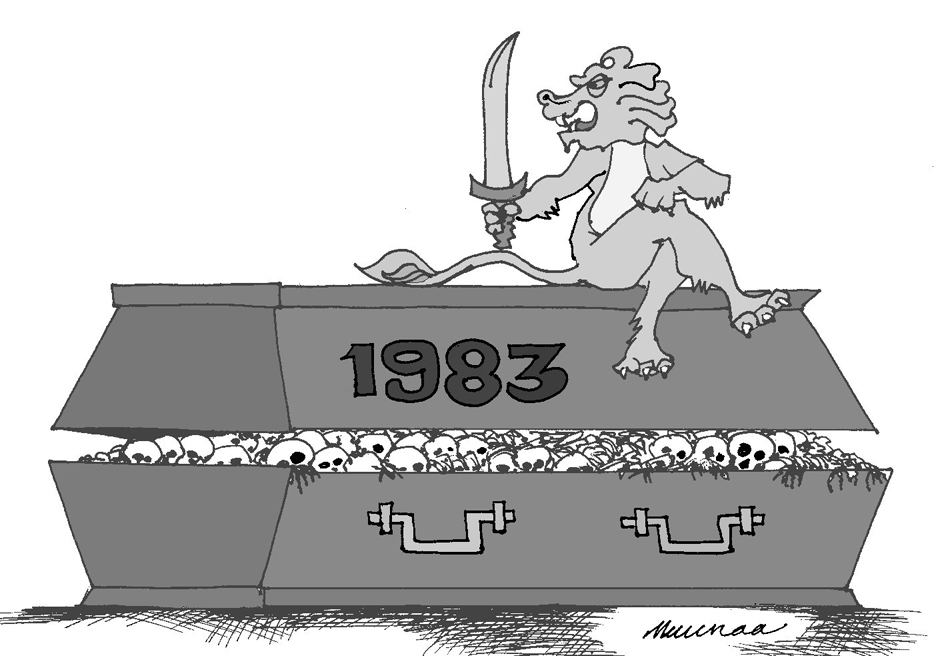by Tamil Guardian, London, July 23, 2021

This year marks 38 years since Black July: the anti-Tamil pogrom where thousands of Tamils were killed by brutal state-supported Sinhala mobs. It was a week of violence that saw Tamils murdered, tortured and displaced. It remains a premeditated and meticulously coordinated act of genocide. The remnants of this pogroms however, still reverberate across the island to this very day. Recent months in particular, carry concerning parallels to the period leading to 1983’s explosive violence, as Sri Lanka returns to patterns of the past with press suppression, arbitrary and racist detention, military occupation and unchecked state violence running devoid of consequence.
The climate of fear, among journalists and human rights defenders in particular, has escalated since the return of the Rajapaksa regime, with the state continuing to arbitrarily detain people, even without charge. Correspondents at the Tamil Guardian know Sri Lanka’s unrelenting harassment and surveillance only too well. Just this month, the notorious Terrorism Investigation Division (TID) arrested and interrogated our Batticaloa-based correspondent Selvakumar Nilanthan, forcing him to disclose personal details and even passwords. It is another cruel but familiar Sri Lankan tactic to intimidate and prevent the state’s abuses from reaching the public lens.
But it is the coupling of this miltiarised harassment and threat of violence with the draconian Prevention of Terrorism Act (PTA) that remains particularly sinister. Nilanthan now fears facing terrorism charges simply for reporting on the illegal activities of the state. It is under the same act that Sri Lanka continues to detain human rights lawyer, Hejaaz Hizbullah, despite widespread and mounting criticism. And the recent extradition of a Tamil man from Qatar under the request of the Sri Lankan TID was also carried out under the PTA, demonstrating the lengths that Colombo will go to enforce its reign of terror.
Even with countless resolutions acknowledging the damage the act causes, and international warnings such as the potential suspension of the preferential European Union GSP+ trading preferences, Sri Lanka continues to deploy it whilst massaging international pressure with calculated gestures and more distracting rhetoric. The supposed release of Tamil political prisoners, many of whom were due to be freed regardless, rings entirely hollow when hundreds of Tamil political prisoners remain detained on bogus charges and when the law is still used to arrest even more. The EU must show it’s threats are not empty and not allow any superficial tweaking of this oppressive legislation, but demand its complete and total repeal. Sri Lanka’s PTA must be scrapped entirely.
As the country approaches two years under the helm of the Rajapaksa brothers, it comes as no surprise that Sri Lanka’s already massive militarisation continues to steam ahead. The president’s latest proposed installation of the controversial General Sir Kotelawala National Defence University (KNDU) Bill, only adds to the regime’s vision of instilling a militant Sinhala-Buddhist supremacy across the island.
Meanwhile, whilst the island grapples with the coronavirus pandemic, economic and human rights crises, the Rajapaksa clan has also been busy consolidating state power within the family. Earlier this month, the cluster of Rajapaksa brothers in the cabinet brought their infamously corrupt sibling Basil Rajapaksa to the fray – his appointment made possible by amending a law to accommodate his return to power. Sri Lanka’s current war crimes accused president Gotabaya Rajapaksa also hinted at his intention to contest for a second term, reversing previous statements. The regime is looking to create a dynasty that will be stubbornly difficult to remove.
In many ways, it is this growing Rajapaksa control of the state and it’s coffers that has left the island facing a massive economic crisis. In recent months alone, Sri Lanka has been marked as having the highest default probability in Asia and with Moody Investor Sentence preparing to place them “under review for downgrade”. The regime however, remains unperturbed, continuing to splurge massive amounts on its bloated military and ignore the potential threats of sanctions and the removal of trading benefits. In fact, the arrogance of the current administration and its regards for international warnings were seen clearly when it decided to release a convicted murderer Duminda Silva, a known ally of the Rajapaksa regime. Despite global outcry, just days later Silva posed for photographs with Mahinda Rajapaksa. The next week, he was appointed Sri Lanka’s Housing Authority Chairman.
The international community has tolerated Sri Lanka’s illiberal and downwards spiral for far too long. It must now show that it is serious and follow through with concerted and consequential action, that seeks to actively halt this worrying trajectory to disaster. Indeed, with several Western states still unwilling to terminate military training with Sri Lanka, suspend trading preferences or issue sanctions against war criminals, it questions the seriousness of their proclaimed commitment towards accountability and human rights. There needs to be an immediate and tangible international action. Without it, the whole world risks the horrific events of 38 years ago happening again.